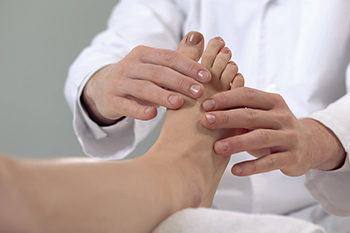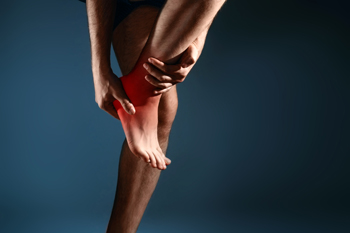Douglas Pacaccio, DPM
Thomas Nordquist, DPM
September 2022
Why Do My Feet Get Cold When I Exercise?

Most people feel warmed up after exercising, but sometimes it can give you cold feet. A look at the symptoms and causes may help to identify the problem. Symptoms include numbness, tingling, and sensitivity to touch. Causes include compressed nerves, socks or footwear that cuts off the circulation to the feet and toes, and trauma from colliding with a hard object. In addition, cold feet may be the result of fractures, bone spurs, joint swelling, and cysts. Treatment can begin with checking footwear, including both shoes and socks, to see if they are somehow affecting your feet. It’s also a good idea to improve arch support, which takes the pressure off the bottom of your feet. A third option is to vary the types of exercises you do to include less stressful ones that give your feet a rest. It is wise to consult a podiatrist if the sensation of cold feet after exercise continues or becomes worse. It might be an indication of a more serious condition, such as peripheral artery disease. After an examination and diagnosis, a podiatrist can offer treatment options, including medication, custom orthotics, and guidance on appropriate footwear for your situation.
Exercising your feet regularly with the proper foot wear is a great way to prevent injuries and build strength. If you have any concerns about your feet, contact one of our podiatrists from Advanced Foot and Ankle Surgeons, Inc. . Our doctors can provide the care you need to keep you pain-free and on your feet.
Exercise for Your Feet
Exercise for your feet can help you gain strength, mobility and flexibility in your feet. They say that strengthening your feet can be just as rewarding as strengthening another part of the body. Your feet are very important, and we often forget about them in our daily tasks. But it is because of our feet that are we able to get going and do what we need to. For those of us fortunate enough to not have any foot problems, it is an important gesture to take care of them to ensure good health in the long run.
Some foot health exercises can include ankle pumps, tip-toeing, toe rises, lifting off the floor doing reps and sets, and flexing the toes. It is best to speak with Our doctors to determine an appropriate regimen for your needs. Everyone’s needs and bodies are different, and the activities required to maintain strength in the feet vary from individual to individual.
Once you get into a routine of doing regular exercise, you may notice a difference in your feet and how strong they may become.
If you have any questions please feel free to contact one of our offices located in Sycamore, and Yorkville, IL . We offer the newest diagnostic and treatment technologies for all your foot and ankle needs.
Signs and Symptoms of Peripheral Neuropathy

Neuropathy is nerve damage that can arise from varied causes. Peripheral neuropathy is damage to the peripheral nerves, and it often affects the lower extremities. It can be experienced as numbness, tingling, or sharp pains in the feet. One might have trouble maintaining their balance, muscle spasms, or muscle weakness. The affected area may feel hot. If left untreated, this condition can hinder quality of life. Those with diabetes, HIV, stroke, high blood pressure, and autoimmune diseases are among those most at risk for this affliction. Accidents, infections, or vitamin deficiencies can also lead to nerve damage. Smoking and drinking can lead to a higher incidence of peripheral neuropathy as well. Lifestyle changes, such as in diet and exercise, can slow down or reverse symptoms and the progression of such nerve damage. The earlier peripheral neuropathy is caught, the better the diagnosis. So it is suggested that you consult with a podiatrist as soon as symptoms are felt.
Neuropathy
Neuropathy can be a potentially serious condition, especially if it is left undiagnosed. If you have any concerns that you may be experiencing nerve loss in your feet, consult with one of our podiatrists from Advanced Foot and Ankle Surgeons, Inc. . Our doctors will assess your condition and provide you with quality foot and ankle treatment for neuropathy.
What Is Neuropathy?
Neuropathy is a condition that leads to damage to the nerves in the body. Peripheral neuropathy, or neuropathy that affects your peripheral nervous system, usually occurs in the feet. Neuropathy can be triggered by a number of different causes. Such causes include diabetes, infections, cancers, disorders, and toxic substances.
Symptoms of Neuropathy Include:
- Numbness
- Sensation loss
- Prickling and tingling sensations
- Throbbing, freezing, burning pains
- Muscle weakness
Those with diabetes are at serious risk due to being unable to feel an ulcer on their feet. Diabetics usually also suffer from poor blood circulation. This can lead to the wound not healing, infections occurring, and the limb may have to be amputated.
Treatment
To treat neuropathy in the foot, podiatrists will first diagnose the cause of the neuropathy. Figuring out the underlying cause of the neuropathy will allow the podiatrist to prescribe the best treatment, whether it be caused by diabetes, toxic substance exposure, infection, etc. If the nerve has not died, then it’s possible that sensation may be able to return to the foot.
Pain medication may be issued for pain. Electrical nerve stimulation can be used to stimulate nerves. If the neuropathy is caused from pressure on the nerves, then surgery may be necessary.
If you have any questions, please feel free to contact one of our offices located in Sycamore, and Yorkville, IL . We offer the newest diagnostic and treatment technologies for all your foot care needs.
Symptoms of Tarsal Tunnel Syndrome

When the tibial nerve becomes compressed on the inside of the ankle, an individual can experience a condition known as tarsal tunnel syndrome (TTS). This affliction has a wide variety of causes. Suffering an ankle injury that causes inflammation can eventually pinch the tibial nerve and cause TTS. Also, individuals living with diabetes or arthritis can exhibit the swelling that eventually causes TTS. A person who has developed TTS could experience any number of different symptoms. First, the most common symptom of TTS is sharp pain along the tibial nerve. Interestingly, the pain can sometimes feel as if it is emanating from several different places, which is why TTS is sometimes confused with other conditions. Besides sharp, shooting pain, an individual might also experience a “pins and needles” sensation where the affected foot feels numb and almost tingly. It is important to note that these symptoms can sometimes worsen with increased physical activity. However, some individuals with TTS do experience pain and other symptoms while at rest or during the nighttime. If you have noticed any of these symptoms, schedule an appointment with a podiatrist today. This foot specialist can diagnose any foot condition you may have and help you treat the problem.
Tarsal tunnel syndrome can be very uncomfortable to live with. If you are experiencing tarsal tunnel syndrome, contact one of our podiatrists of Advanced Foot and Ankle Surgeons, Inc. . Our doctors can provide the care you need to keep you pain-free and on your feet.
Tarsal Tunnel Syndrome
Tarsal tunnel syndrome, which can also be called tibial nerve dysfunction, is an uncommon condition of misfiring peripheral nerves in the foot. The tibial nerve is the peripheral nerve in the leg responsible for sensation and movement of the foot and calf muscles. In tarsal tunnel syndrome, the tibial nerve is damaged, causing problems with movement and feeling in the foot of the affected leg.
Common Cause of Tarsal Tunnel Syndrome
- Involves pressure or an injury, direct pressure on the tibial nerve for an extended period of time, sometimes caused by other body structures close by or near the knee.
- Diseases that damage nerves, including diabetes, may cause tarsal tunnel syndrome.
- At times, tarsal tunnel syndrome can appear without an obvious cause in some cases.
The Effects of Tarsal Tunnel Syndrome
- Different sensations, an afflicted person may experience pain, tingling, burning or other unusual sensations in the foot of the affected leg.
- The foot muscles, toes and ankle become weaker, and curling your toes or flexing your foot can become difficult.
- If condition worsens, infections and ulcers may develop on the foot that is experiencing the syndrome.
A physical exam of the leg can help identify the presence of tarsal tunnel syndrome. Medical tests, such as a nerve biopsy, are also used to diagnose the condition. Patients may receive physical therapy and prescriptive medication. In extreme cases, some may require surgery.
If you have any questions please feel free to contact one of our offices located in Sycamore, and Yorkville, IL . We offer the newest diagnostic and treatment technologies for all your foot and ankle needs.
Foot Pain and Golf

Foot pain can interfere with your enjoyment of golf, particularly pain in your big toe, heel, and ball of the foot. Foot pain can result from stiff joints, stretched-out tissues, and nerve damage. Relief is possible and often without surgery. The three most common foot conditions sustained by golfers are neuromas, arthritis, and heel pain. A Morton’s neuroma is a thickened, enlarged nerve in the ball of the foot that is compressed or irritated. This can cause pain when transferring weight from one foot to the other while swinging a golf club. Arthritis in the joint of the big toe also makes it difficult to follow through on a swing. Heel pain from plantar fasciitis, an inflammation of the band of tissue that runs from the heel to the ball of the foot, makes it uncomfortable for a golfer to maintain a solid stance while swinging the golf club. Less common afflictions that can cause pain and interfere with golf include ankle arthritis, Achilles tendonitis, and corns and calluses. If you golf and are suffering from foot pain, consult with a podiatrist who will be able to diagnose the problem and provide appropriate treatment so that you are back to good golf form as quickly as possible.
Sports related foot and ankle injuries require proper treatment before players can go back to their regular routines. For more information, contact one of our podiatrists of Advanced Foot and Ankle Surgeons, Inc. . Our doctors can provide the care you need to keep you pain-free and on your feet.
Sports Related Foot and Ankle Injuries
Foot and ankle injuries are a common occurrence when it comes to athletes of any sport. While many athletes dismiss the initial aches and pains, the truth is that ignoring potential foot and ankle injuries can lead to serious problems. As athletes continue to place pressure and strain the area further, a mild injury can turn into something as serious as a rupture and may lead to a permanent disability. There are many factors that contribute to sports related foot and ankle injuries, which include failure to warm up properly, not providing support or wearing bad footwear. Common injuries and conditions athletes face, including:
- Plantar Fasciitis
- Plantar Fasciosis
- Achilles Tendinitis
- Achilles Tendon Rupture
- Ankle Sprains
Sports related injuries are commonly treated using the RICE method. This includes rest, applying ice to the injured area, compression and elevating the ankle. More serious sprains and injuries may require surgery, which could include arthroscopic and reconstructive surgery. Rehabilitation and therapy may also be required in order to get any recovering athlete to become fully functional again. Any unusual aches and pains an athlete sustains must be evaluated by a licensed, reputable medical professional.
If you have any questions please feel free to contact one of our offices located in Sycamore, and Yorkville, IL . We offer the newest diagnostic and treatment technologies for all your foot and ankle needs.
Reminder: When Was the Last Time...?
Blog Archives
- July 2024
- June 2024
- May 2024
- April 2024
- March 2024
- February 2024
- January 2024
- December 2023
- November 2023
- October 2023
- September 2023
- August 2023
- July 2023
- June 2023
- May 2023
- April 2023
- March 2023
- February 2023
- January 2023
- December 2022
- November 2022
- October 2022
- September 2022
- August 2022
- July 2022
- June 2022
- May 2022
- April 2022
- March 2022
- February 2022
- January 2022
- December 2021
- November 2021
- October 2021
- September 2021
- August 2021
- July 2021
- June 2021
- May 2021
- April 2021
- March 2021
- February 2021
- January 2021
- December 2020
- November 2020
- October 2020
- September 2020
- August 2020
- July 2020
- June 2020
- May 2020
- April 2020
- March 2020
- February 2020
- January 2020
- December 2019
- November 2019
- October 2019
- September 2019
- August 2019
- July 2019
- June 2019
- May 2019
- April 2019
- March 2019
- February 2019
- January 2019
- December 2018
- November 2018
- October 2018
- September 2018









